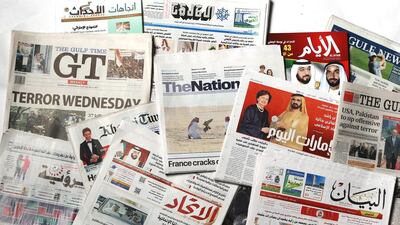I arrived in Abu Dhabi more than eight years ago to launch this newspaper as its first editor. A few weeks ago, just prior to returning to the UK, I was graciously invited to say goodbye to the newsroom by the incumbent editor.
Even though I had had little to do with editorial matters since leaving the paper in 2009, I am grateful that the final curtain fell for me where it had initially been raised, huddled with The National’s journalists in its Abu Dhabi Media headquarters.
Those present, I said, had helped construct a better local narrative on topics ranging from the arts to traffic, weather, landlords, pets and bureaucracy, right through to more weighty accounts of the development of infrastructure and non-oil diversification.
The National had pioneered routine reporting in English, in keeping with western broadsheet tradition, on emerging national institutions such as the criminal courts and the deliberations of the Federal National Council. Its network of journalists was able to deliver content commissioned in the UAE. This was achieved in a regional market where robust, newsroom-commissioned reportage can often be overlooked in favour of reliance on wire services, rewritten press releases and opinion page polemics.
I mentioned in particular one Emirati staff reporter who had joined the newspaper as a trainee and who had graduated to reporting, in English, criminal court proceedings in Abu Dhabi.
The development of indigenous talent in news reportage and commissioning is vital in a market where a significant proportion of news gathering has been effectively outsourced to expatriates, and where so much digital content generated in an increasingly troubled region serves to blur divisions between reportage and opinion and between fact and rumour.
I was asked once by a senior media figure here what I believed was the key challenge to local journalism. I replied that I thought the country had about 15 years to install a vested local army of journalists trained in news commissioning and reporting before the national story was swept away in a digital tsunami of disjointed and uncontextualised blogs, tweets and single-agenda websites acting more as aggregators of outrage and gossip than as news providers.
A proper news operation is born from the unique daily interaction between trained commissioning editors, journalists, photographers and production teams who combine to provide a prioritised news digest.
Now that any individual or group with a Wi-Fi connection and an agenda can reach millions without recourse to traditional journalistic principles such as impartiality or fact-checking, it becomes all the more important to protect these same principles.
The good news is that even though consumption habits are increasingly digital, traditional media platforms in the region still enjoy enough market share to embrace the new age on their own terms. Alongside this, government involvement in the sector is significant enough to facilitate the recruitment and training of professional local journalists.
It is important to devote resources to training in news gathering, news commissioning and meaningful internships. Throughout my career I have met hundreds of hopefuls clutching diplomas from journalism programmes who understand a lot about media theory but who appeared incapable of writing a straight news story.
Theoretical training must be combined with practical exposure to journalistic operations. There are enough government- supported media zones, universities, academies, foundations and media companies to ensure that a local journalism candidate gets end-to-end theoretical and practical training. Breaking down media silos in pursuit of accomplished local journalistic talent and practical training should be a priority.
It is important also to seek to elevate perceptions of the profession. Some Emiratis who enter journalism regard it as having less status than finance, government-sector senior management or public relations. Emiratis judged to be important to other key sectors are sometimes professionally ring-fenced, sent abroad for further experience and given clear career paths. The media should be considered as being as important as finance, engineering or business.
There is great demand for Arabic-language content and the region has many translated western news services, portals and other licensed products. Though welcome in themselves, these do not carry the same weight and relevance as outlets established by local mandate and financing and vested in the communities they serve.
Finally, editors and media operators in the public and private sector should do everything in their power to improve local coverage by insisting on strong local reportage and analysis instead of reliance on releases, wire stories and government information bulletins. Traditional media margins are obviously improved by lack of investment in talent but this will prove to be a false economy in the end.
Western media brands that have best survived the trials of the digital age are the ones that have stood by their journalism. The Daily Mail in the UK and The New York Times have rightly seen their future as resting on the preservation of quality and the projection of journalistic excellence. If regional media outlets do not similarly defend and improve their capacity for journalism, they will be overwhelmed and the chance to properly shape the national and regional narrative will be lost.
Martin Newland is a former editor-in-chief of The National

